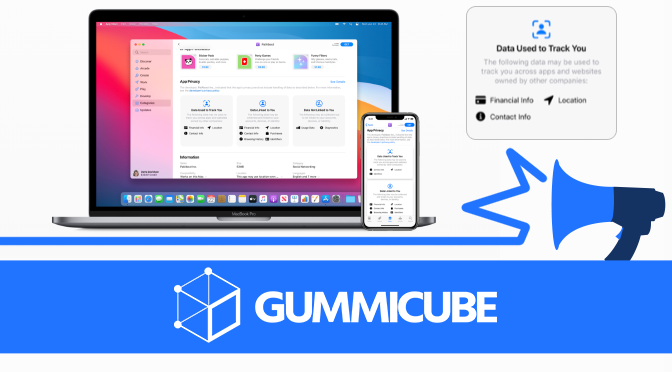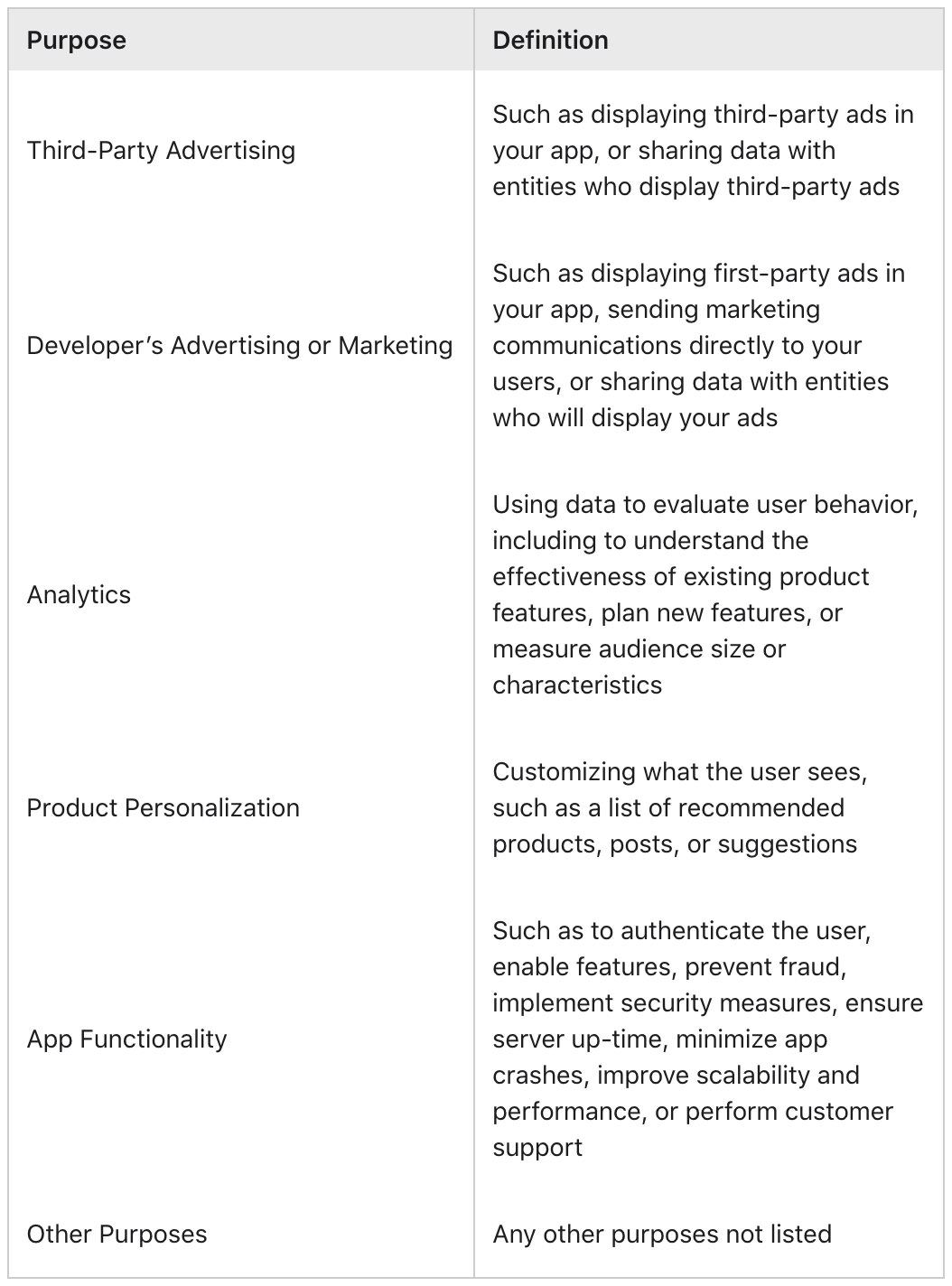
How Your App Performance Impacts ASO
Posted on April 24th, 2025
Google Play now prioritizes user experience in ASO. Learn how new quality metrics impact your app's visibility, rankings, and overall success.

Starting December 8th, Apple will require developers to provide more detailed information about what data their apps collect and how it is used.
Dubbed as privacy “nutrition labels” by Apple earlier this year at WWDC, users will be shown a more digestible list of information on an App’s product page up-front, detailing the data the app will collect. Along with preparing your next launch or update with the App Store Holiday Schedule in mind, this December 8th change is one to mark on the calendar if you’re looking to make an end-of-year update.
Similar to the content rating questionnaire used by both Apple and Google, developers will need to fill out a series of questions in App Store Connect when preparing their new app or next version. These can be found under My Apps -> App Store -> General, in a new “App Privacy” section.
From here, you will be guided through a series of prompts that ask what kind of data your app collects, and how it is shared. It is up to the developer to be aware of not only the data their app collects directly, but the kind of data collected by third party partners, including analytics tools, advertising networks and third-party SDKs. Even if the developer is not actively using the data collected by a third party, they must be aware of all the ways any third party they use collects data and state it here.
Apple also provides a list of data types that may qualify as optional to disclose here. These include instances where:
• The data is not used for tracking purposes, meaning the data is not linked with Third-Party Data for advertising or advertising measurement purposes, or shared with a data broker. For details, see the Tracking section.• The data is not used for Third-Party Advertising, your Advertising or Marketing purposes, or for Other Purposes, as those terms are defined in the Tracking section.• Collection of the data occurs only in infrequent cases that are not part of your app’s primary functionality, and which are optional for the user.• The data is provided by the user in your app’s interface, it is clear to the user what data is collected, the user’s name or account name is prominently displayed in the submission form alongside the other data elements being submitted, and the user affirmatively chooses to provide the data for collection each time.
Note that if a data type collected by your app meets some, but not all, of the above criteria, it must be disclosed.
This new requirement is a big change, especially for developers simply looking to submit a new build who may not be 100% sure about what kinds of data their app collects and how it is used. Fortunately, in conjunction with laying out the structure for these “nutrition labels” in the form of a guided questionnaire, Apple has several help pages to further explain the new requirements and what types of data should be disclosed.
Apple’s developer website contains a robust list of information on the new requirement, including:
• General information on what to disclose and what a developer is responsible to know
• Definitions of frequently used terms in this new questionnaire, to avoid confusion- including what it means in Apple’s world to “collect” data and what a “third-party partner” is
• A lengthy list of the types of data apps can collect and what to disclose where
• A list to help developers better understand how to articulate what they use collected data for
• Other definitions and guidelines pertinent to this new feature, such as data linked to users, tracking capabilities and the differences between a “privacy policy” URL and a “privacy choice” URL
• Additional information and use cases

Above: a list of Data Use purposes and definitions from Apple.
With this new requirement coming into play starting December 8th, developers will need to prepare ahead of time. Review not just your app itself, but all third-party integrations within your app, to familiarize yourself with the kinds of data collected and how it is used. While this new feature fortunately comes in the form of a relatively straightforward questionnaire accompanied by detailed documentation, erroneously entering the information (intentionally or not) could mean that the app faces rejection.
With the App Store Holiday Schedule quickly approaching, having to submit and get rejected multiple times, simply for a lack of understanding how data is collected by your app or third party software it uses, could mean missing Apple’s holiday shutdown deadline.
This announcement, along with other announced changes in how user data collection will be disclosed and tracked on iOS 14, resulted in a massive uproar earlier this year. While transparency in data collection is a great thing for end users to be aware of, many reports state the ease of opting out of data collection and tracking will see a massive shift for various industries, including one assertion by Facebook that ad revenue could decline by upwards of 40%. This new privacy disclosure feature is one of several factors that will come into play among several privacy changes to come in 2021.
Outside of the implications opting out of data collection has on advertising, the new privacy “nutrition labels” will have an impact on conversion rates, since they are visible on an App’s product page. The change is likely to benefit some developers, may be detrimental to others, but ultimately has yet to be seen.
For now, the only sure thing is this: developers need to understand how their apps collect data and that their updates comply with the new guidelines by December 8th. This will help lower the risk of app rejection for things like not knowing which data is and is not “optional” or what their third party partners track. As the Apple holiday shutdown deadline approaches, having a submission go through without any snags is critical to getting the latest and greatest updates live before the end of the year. Beyond getting these changes implemented to adhere to new compliance guidelines, developers should keep a close eye on factors it can influence- such as conversion rates, ratings and reviews- once it is fully rolled out on the product page.
One study shows adding food labeling reduces unhealthy dietary intake by 13%, with a nearly inverse increase in vegetable consumption. If their “nutrition label” namesake is anything to go off of, these new privacy labels may foster a more “data-diet conscious” era of App Store consumers, and developers will need to adjust accordingly.

Google Play now prioritizes user experience in ASO. Learn how new quality metrics impact your app's visibility, rankings, and overall success.

Apple Ads is the new name for Apple Search Ads. Learn what this rebrand could mean for your app's visibility and ASO.

Apple now requires all iOS apps to use Xcode 15 and iOS 17 SDK. Learn what this means for developers—and how it impacts your ASO strategy.